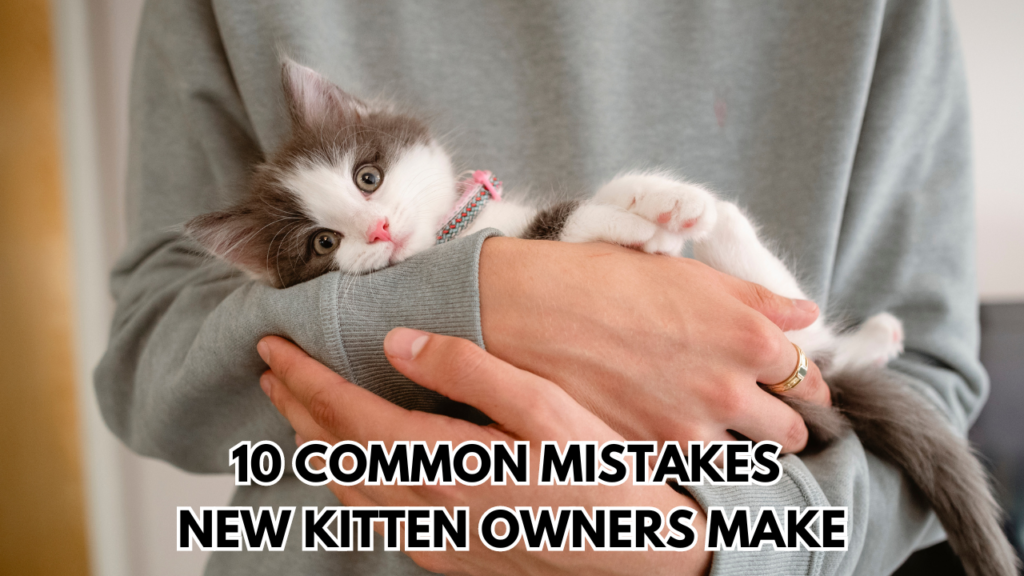So, your new kitten won’t stop meowing. It’s cute at first, but after hours of constant noise, you might find yourself desperate for some peace and quiet.
What’s going on? Why is your kitten so loud, and more importantly, how can you get them to calm down?
In this article, we’ll explore why kittens meow excessively and what you can do to address the issue. By the end, you’ll have practical tips to help your little furball settle down and save your sanity.
Understanding the Meowing
First, let’s understand why kittens meow so much. Cats use vocalization to communicate with their human companions.
While adult cats typically meow to humans rather than other cats, kittens will meow to their mothers and to us. Here are some common reasons why your kitten might be meowing non-stop:
1. Hunger
One of the most common reasons for a meowing kitten is hunger. Kittens have small stomachs and need to eat frequently. If your kitten is meowing around mealtime, it could be a sign they’re hungry.
Ensure you’re feeding them a balanced diet and following the recommended feeding schedule for their age.
2. Attention
Kittens crave attention and companionship. If they feel lonely or bored, they might meow to get your attention.
Spend time playing with your kitten, cuddling, and talking to them. This helps satisfy their need for social interaction.
3. Discomfort or Pain
Excessive meowing can indicate that your kitten is uncomfortable or in pain. Check for any signs of illness or injury.
If your kitten is still meowing after you’ve ruled out other causes, it’s a good idea to take them to the vet for a check-up.
4. Stress or Anxiety
New environments, changes in routine, or the presence of other pets can cause stress or anxiety in kittens. This can lead to increased vocalization.
Make sure your kitten has a safe, quiet space to retreat to and try to maintain a consistent routine.
5. Exploration and Curiosity
Kittens are naturally curious and love to explore. Sometimes, they meow because they’re trying to get into or out of a space.
Ensure your home is kitten-proofed, with plenty of safe areas for them to explore.
6. Wanting to Play
Kittens have boundless energy and love to play. If they’re not getting enough playtime, they might meow to let you know they want to play.
Interactive toys and regular play sessions can help burn off some of that energy.
How to Calm a Meowing Kitten
Now that we know some reasons why your kitten might be meowing, let’s look at how to address it. Here are some tips to help calm your kitten:
1. Establish a Routine
Kittens thrive on routine. Try to feed, play, and cuddle with your kitten at the same times each day. This helps them feel secure and can reduce anxiety-related meowing.
2. Feed Regularly
Make sure your kitten is getting enough food. Follow the feeding guidelines for their age and weight. If you’re unsure, consult your vet for advice on the best diet for your kitten.
3. Provide Plenty of Playtime
Engage your kitten with interactive toys and regular play sessions. This helps keep them physically and mentally stimulated, reducing boredom and the resulting meowing.
4. Create a Safe Space
Set up a quiet, comfortable area where your kitten can retreat to if they feel overwhelmed. This could be a cozy bed in a quiet room or a cat tree with hiding spots. A safe space helps reduce stress and excessive vocalization.

5. Use Positive Reinforcement
Reward your kitten with treats or affection when they’re quiet. This helps them learn that being calm and quiet gets them positive attention. Avoid giving in to meowing for attention, as this can reinforce the behavior.
6. Check for Medical Issues
If your kitten’s meowing seems excessive or if they show any signs of illness, take them to the vet. It’s important to rule out any underlying medical issues that might be causing discomfort.
7. Spend Quality Time Together
Kittens need a lot of social interaction. Spend quality time with your kitten each day, playing, cuddling, and talking to them. This helps meet their need for attention and can reduce meowing.
8. Provide Enrichment
Enrich your kitten’s environment with toys, scratching posts, and climbing structures. This helps keep them entertained and less likely to meow out of boredom.
Bonus Tip: Use Calming Products
Consider using calming products like Feliway diffusers or sprays. These products release pheromones that help reduce stress and anxiety in cats. They can be particularly helpful in new environments or during stressful situations.
Read: Why does My Kitten Play in the Litter Box ?
Dealing with a meowing kitten can be challenging, but understanding the reasons behind the behavior and taking steps to address it can make a big difference. By establishing a routine, providing plenty of playtime and attention, and ensuring your kitten’s needs are met, you can help reduce excessive meowing.
Remember, patience is key. Your kitten is still learning and adjusting to their new home. With time and proper care, they’ll settle down and become a happy, well-adjusted member of your family.
Final Thoughts
Kittens are full of energy and curiosity, and meowing is one way they communicate with us. By paying attention to their needs and addressing any issues, you can create a peaceful and loving environment for your new furry friend. Enjoy the journey of raising your kitten and cherish the special moments you share.
Watch Videos about Cat & Kitten Care on Youtube @naowthecat